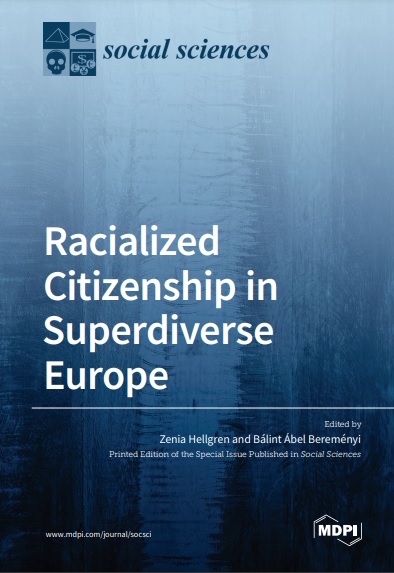UPF researchers compile in a book the latest studies on racialization in contemporary Europe
UPF researchers compile in a book the latest studies on racialization in contemporary Europe
“Racialized Citizenship in Superdiverse Europe”, edited by Zenia Hellgren and Bálint Ábel Bereményi, is an online, open access work containing a series of academic articles published in a special issue of the journal Social Sciences, with the participation of thirteen authors mostly linked to different European universities.

Zenia Hellgren, a political sociologist and a researcher with the Interdisciplinary Research Group on Immigration (GRITIM-UPF), linked to the Department of Political and Social Sciences, and Bálint Ábel Bereményi, a María Zambrano researcher with the Youth, Society and Communication Research Group (JOVIScom) of the Department of Communication, have edited the book Racialized Citizenship in Superdiverse Europe, which analyses how racialization shapes European societies and the lives of those who suffer it.
The work, recently published in open access online by the academic publishing platform MDPI, is the reedition of a special issue of the journal Social Sciences, which includes eleven articles written from a multidisciplinary standpoint (from fields as diverse as political science, anthropology, law and sociology). They are signed by thirteen authors linked to European universities (and in one case, to a Spanish political party), in what is a powerful collection of new publications by scholars whose research contributes to placing the study of race and racialization at the forefront of European academia.
“There is broad awareness that experiences of racism and discrimination seriously harm the sense of belonging, as well as the opportunities to enjoy social mobility and quality of life for many immigrants and ethnic minority peoples in European societies”
Today’s European societies are often described as “superdiverse” in order to define ethnic, cultural and religious pluralism resulting from decades of immigration. At the same time, Europe seems increasingly polarized in its approach to migration and diversity. Xenophobic political movements and public debate are gaining ground across the continent, while anti-racist actors and critical scholars are increasingly focusing on racialization as the cause of inequality and injustice.
“There is broad awareness that experiences of racism and discrimination seriously harm the sense of belonging, as well as the opportunities to enjoy social mobility and quality of life for many immigrants and ethnic minority peoples in European societies”, the editors state in the preface to the work. However, they assert that there is also a persistent reluctance to talk about the racial dimension of the type of disadvantages and social exclusion that disproportionately affect immigrants, their descendants and other racialized groups.
A multi-voice publication with the participation of four UPF researchers, which offers in-depth analyses of the different aspects of racialization
Racialized Citizenship in Superdiverse Europe contains eleven works (an editorial and ten articles) by researchers from European universities and research centres in Spain, Italy, Germany, Portugal, and in one case (the last article) by a politician linked to a party with representation in the Spanish parliament.

The publisher “Far from Colorblind. Reflections on Racialization in Contemporary Europe” is signed by the two editors of the book, Zenia Hellgren and Bálint Ábel Bereményi. In this work, which defines the conceptual framework of the special issue, the authors recall that “colonialist racialization is inherent in the history of Europe, and that it forms the basis of persistent and often thoughtless and indirect racism”.
Implicit value systems, according to which white people are automatically considered more competent, more desirable, preferable in general terms and more “European”, translate into patterns of everyday racism affecting the self-image and life chances of white and non-white Europeans. The authors, who advocate the need to critically examine whiteness, refute the idea of a “post-racial” condition and analyse the consequences of ethno-racial differentiation and stigmatization for groups such as black Europeans, European Roma, and non-white migrants in general.
Zenia Hellgren, this time accompanied by Lorenzo Gabrielli, also a GRITIM-UPF researcher, are the co-authors of another article entitled “Racialization and Aporophobia: Intersecting Discriminations in the Experiences of Non-Western Migrants and Spanish Roma”. Here, they approach a gap in the scholarship on (super)diversity, discrimination and racism: they place the experiences of non-western migrants and Roma people in the same conceptual framework of stigmatization based on racialization and aporophobia.
The last article written by UPF researchers is “The Charnegroes: Black Africans and the Ontological Conflict in Catalonia”, signed by Saiba Bayo, a doctoral student with the Department of Political and Social Sciences and an expert in the area of political philosophy. The researcher deals with the meaning of “being” Catalan for black Africans in Catalonia, and analyses in depth the results of the encounter between black African migrants and the constant resignification of Catalan national identity.
The other articles are written by Dan Rodríguez-García, Colleen Boland and Laia Narciso (all linked to the Autonomous University of Barcelona), Sebastian Carlotti (University of Pisa), Tina Magazzini (European University Institute of Florence), Carolin Müller (Technical University of Dresden), Olga Magrano and María Manuela Mendes (Lisbon University Institute), and, finally, Ismael Cortés, a member of the Spanish Parliament affiliated to the party Unidas Podemos / En Comú Podem.
Some of the issues dealt with in these articles are the inherent problematics of transferring the figure of racialized migrant into the West African region; the new challenges related to diversity in Europe; an intersectional approach to anti-racism in Europe, through the 2020-2025 action plan; the persistence of racial constructs in Spain; the discourse of European Muslim youth and gender (in)equality; educational trajectories and the views of girls and young women coming to Spain from West Africa; structural racism and the racialization of Roma/ciganos in Portugal and which might be the responses in Spain to combat antigypsyism during the coming decade.
Reference work: Hellgren Z., Bereményi, B.À. (eds.) (February 2022). Racialized Citizenship in Superdiverse Europe (Reedition of the special issue under the same title published in the journal Social Sciences, MDPI Books, Social Sciences collection).
